2015江苏高考英语阅读理解C句子成分分析
2016江苏高考英语阅读理解C句子成分分析
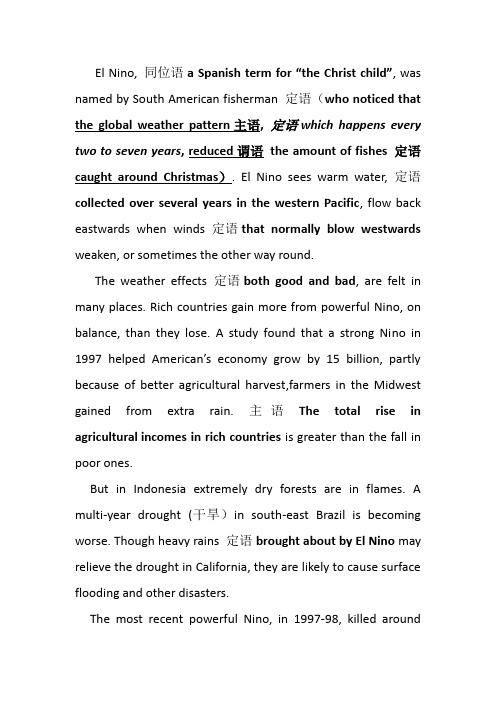
El Nino, 同位语a Spanish term for “the Christ child”, was named by South American fisherman 定语(who noticed that the global weather pattern主语, 定语which happens every two to seven years, reduced谓语the amount of fishes 定语caught around Christmas). El Nino sees warm water, 定语collected over several years in the western Pacific, flow back eastwards when winds 定语that normally blow westwards weaken, or sometimes the other way round.The weather effects 定语both good and bad, are felt in many places. Rich countries gain more from powerful Nino, on balance, than they lose. A study found that a strong Nino in 1997 helped American’s economy grow by 15 billion, partly because of better agricultural harvest,farmers in the Midwest gained from extra rain. 主语The total rise in agricultural incomes in rich countries is greater than the fall in poor ones.But in Indonesia extremely dry forests are in flames. A multi-year drought (干旱)in south-east Brazil is becoming worse. Though heavy rains 定语brought about by El Nino may relieve the drought in California, they are likely to cause surface flooding and other disasters.The most recent powerful Nino, in 1997-98, killed around21,000 people and caused damage 定语worth $36 billion around the globe. But such Ninos come with months of warning, and so much is known about how they happen that governments can prepare. 状语According to the Overseas Development Institute (ODI), however, just 12% of disaster-relief funding in the past two decades has gone on reducing risks in advance, rather than recovery and rebuilding afterwards. This is despite evidence 同位语that a dollar 定语spent on risk-reduction saves at least two on reconstruction.Simple improvements to infrastructure (基础设施)can reduce the spread of disease. Better sewers (下水道)make it less likely 宾语that heavy rain is followed by an outbreak of the disease of bad stomach. Stronger bridges mean villages are less likely to be left 主补without food and medicine after floods. According to a paper in 2011 by Mr Hsiang and co-authors, civil c onflict is related to El Nino’s harmful effects—and the poorer the country, the stronger the link. Though the relationship may not be causal, 主语helping divided communities to prepare for disasters would at least reduce the risk 同位语that those disasters are followed by killing and wounding people. Since the poorest are least likely to make up for their losses from disasters linked to El Nino, 主语reducing their losses needs to be the priority.61. W hat can we learn about El Nino in Paragraph 1?A.It is named after a South American fisherman.B.It takes place almost every year all over the world.C.It forces fishermen to stop catching fish around Christmas.D.It sees the changes of water flow direction in the ocean.62. W hat may El Ninos bring about to the countries affected?A.Agricultural harvests in rich countries fall.B.Droughts become more harmful than floods.C.Rich countries’ gains are greater than their losses.D.Poor countries suffer less from droughts economically.63. T he data provided by ODI in Paragraph 4 suggest that_________.A.more investment should go to risk reductionB. governments of poor countries need more aidC. victims of El Nino deserve more compensationD. recovery and reconstruction should come first64. W hat is the author’s purpose in writing the passage?A. To introduce El Nino and its origin.B. To explain the consequences of El Nino.C. To show ways of fighting against El Nino.D.To urge people to prepare for El Nino.。
高考英语语法句子成分分析
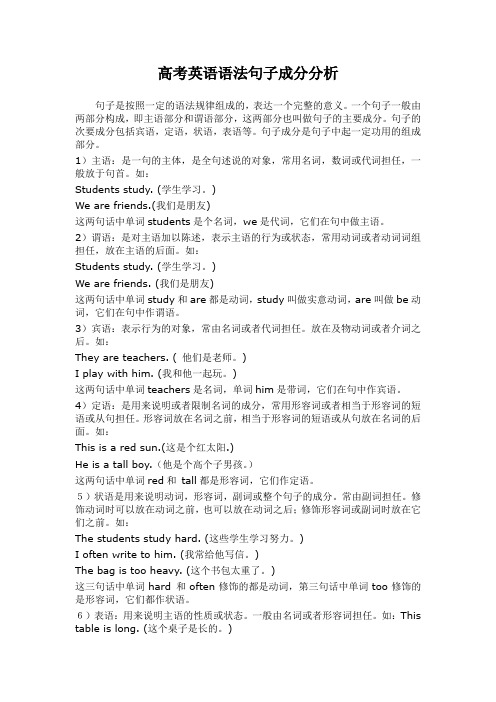
高考英语语法句子成分分析句子是按照一定的语法规律组成的,表达一个完整的意义。
一个句子一般由两部分构成,即主语部分和谓语部分,这两部分也叫做句子的主要成分。
句子的次要成分包括宾语,定语,状语,表语等。
句子成分是句子中起一定功用的组成部分。
1)主语:是一句的主体,是全句述说的对象,常用名词,数词或代词担任,一般放于句首。
如:Students study. (学生学习。
)We are friends.(我们是朋友)这两句话中单词students是个名词,we是代词,它们在句中做主语。
2)谓语:是对主语加以陈述,表示主语的行为或状态,常用动词或者动词词组担任,放在主语的后面。
如:Students study. (学生学习。
)We are friends. (我们是朋友)这两句话中单词study和are都是动词,study叫做实意动词,are叫做be动词,它们在句中作谓语。
3)宾语:表示行为的对象,常由名词或者代词担任。
放在及物动词或者介词之后。
如:They are teachers. ( 他们是老师。
)I play with him. (我和他一起玩。
)这两句话中单词teachers是名词,单词him是带词,它们在句中作宾语。
4)定语:是用来说明或者限制名词的成分,常用形容词或者相当于形容词的短语或从句担任。
形容词放在名词之前,相当于形容词的短语或从句放在名词的后面。
如:This is a red sun.(这是个红太阳.)He is a tall boy.(他是个高个子男孩。
)这两句话中单词red和tall都是形容词,它们作定语。
5)状语是用来说明动词,形容词,副词或整个句子的成分。
常由副词担任。
修饰动词时可以放在动词之前,也可以放在动词之后;修饰形容词或副词时放在它们之前。
如:The students study hard. (这些学生学习努力。
)I often write to him. (我常给他写信。
2015年高考英语句子成分及句子结构
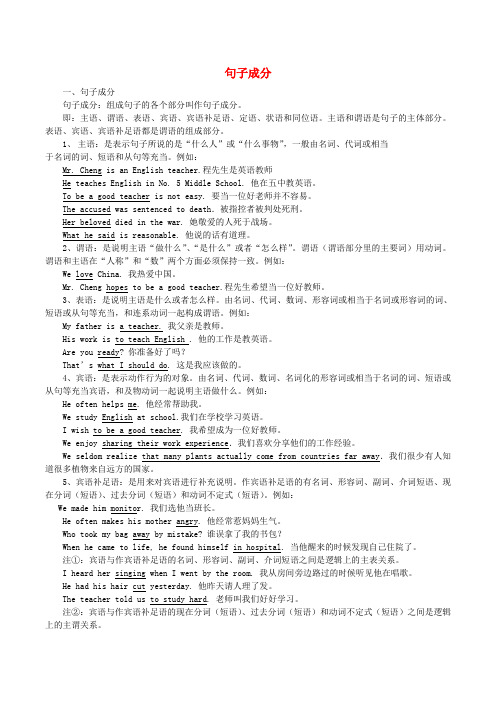
句子成分一、句子成分句子成分:组成句子的各个部分叫作句子成分。
即:主语、谓语、表语、宾语、宾语补足语、定语、状语和同位语。
主语和谓语是句子的主体部分。
表语、宾语、宾语补足语都是谓语的组成部分。
1、主语:是表示句子所说的是“什么人”或“什么事物”,一般由名词、代词或相当于名词的词、短语和从句等充当。
例如:Mr. Cheng is an English teacher.程先生是英语教师He teaches English in No. 5 Middle School. 他在五中教英语。
To be a good teacher is not easy. 要当一位好老师并不容易。
The accused was sentenced to death.被指控者被判处死刑。
Her beloved died in the war. 她敬爱的人死于战场。
What he said is reasonable. 他说的话有道理。
2、谓语:是说明主语“做什么”、“是什么”或者“怎么样”。
谓语(谓语部分里的主要词)用动词。
谓语和主语在“人称”和“数”两个方面必须保持一致。
例如:We love China. 我热爱中国。
Mr. Cheng hopes to be a good teacher.程先生希望当一位好教师。
3、表语:是说明主语是什么或者怎么样。
由名词、代词、数词、形容词或相当于名词或形容词的词、短语或从句等充当,和连系动词一起构成谓语。
例如:My father is a teacher. 我父亲是教师。
His work is to teach English . 他的工作是教英语。
Are you ready? 你准备好了吗?That’s what I should do. 这是我应该做的。
4、宾语:是表示动作行为的对象。
由名词、代词、数词、名词化的形容词或相当于名词的词、短语或从句等充当宾语,和及物动词一起说明主语做什么。
2015江苏高考英语阅读理解C句子成分分析
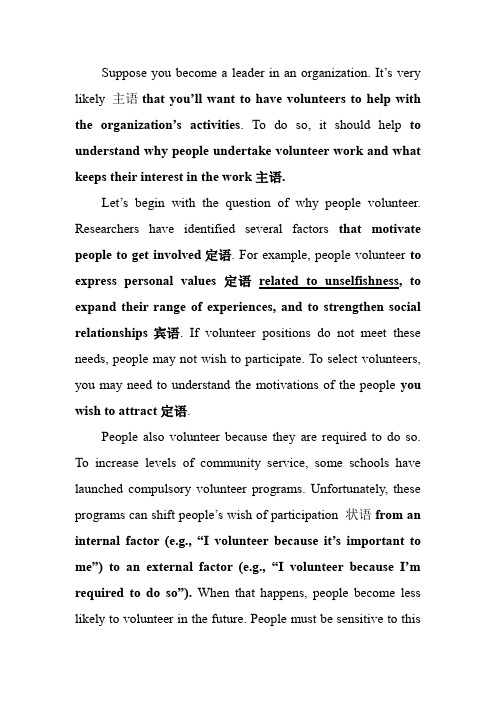
Suppose you become a leader in an organization. It’s very likely 主语that you’ll want to have volunteers to help with the organization’s activities. To do so, it should help to understand why people undertake volunteer work and what keeps their interest in the work主语.Let’s begin with the question of why people volunteer. Researchers have identified several factors that motivate people to get involved定语. For example, people volunteer to express personal values 定语related to unselfishness, to expand their range of experiences, and to strengthen social relationships宾语. If volunteer positions do not meet these needs, people may not wish to participate. To select volunteers, you may need to understand the motivations of the people you wish to attract定语.People also volunteer because they are required to do so. To increase levels of community service, some schools have launched compulsory volunteer programs. Unfortunately, these programs can shift people’s wish of participation 状语from an internal factor (e.g., “I volunteer because it’s important to me”) to an external factor (e.g., “I volunteer because I’m required to do so”).When that happens, people become less likely to volunteer in the future. People must be sensitive to thispossibility when they make volunteer activities a must宾补.Once people begin to volunteer, what leads them to remain in their positions over time? To answer this question, researchers have conducted follow-up studies 定语in which they track volunteers over time. For instance, one study followed 238 volunteers in Florida over a year. One of the most important factors 定语that influenced their satisfaction as volunteers was the amount of suffering 定语they experienced in their volunteer positions. Although this result may not surprise you, it leads to important practical advice. The researchers note that attention should be given 状语to “training methods that would prepare volunteers for troublesome situations or provide them with strategies for coping with the problem they do experience”.Another study of 302 volunteers at hospitals in Chicago focused on individual differences in the degree 定语to which people view “volunteer” as an important social role. It was assumed that those people 定语for whom the role of volunteer was most part of their personal identity would also be most likely to continue volunteer work. Participants indicated the degree 定语to which the social role mattered by responding to statements such as “Volunteering in Hospitalis an important part of who I am.”Consistent with the researcher s’ expectations, they found a positive correlation (正相关) between the strength of role identity and the length of time people continued to volunteer定语. These results, once again, lead to concrete advice: “Once an individual begins volunteering, continued efforts might focus on developing a volunteer role identity.... Items like T-shirts 定语that allow volunteers to be recognized publicly for their contributions can help strengthen role identity”.61. People volunteer mainly out of ______.A. academic requirementsB. social expectationsC. financial rewardsD. internal needs62. What can we learn from the Florida study?A. Follow-up studies should last for one year.B.V olunteers should get mentally prepared.C. Strategy training is a must in research.D. V olunteers are provided with concrete advice.63. What is most likely to motivate volunteers to continue their work?A. Individual differences in role identity.B. Publicly identifiable volunteer T-shirts.C. Role identity as a volunteer.D. Practical advice fromresearchers.64. What is the best title of the passage?A. How to Get People to V olunteerB. How to Study V olunteer BehaviorsC. How to Keep Volunteers’ InterestD. How to Organize V olunteer Activities。
英语句子成分图

英语句子成分图在英语语法中,一个句子通常由多个成分组成,这些成分构成了句子的结构。
其中,主要的句子成分包括主语、谓语、宾语、定语、状语等。
这些成分在句子中的位置和作用各不相同,下面我们来详细了解一下。
1、主语主语是句子的第一成分,通常位于谓语之前。
主语表示句子所描述的行为或状态的主体。
例如,“The cat is sleeping”(猫正在睡觉)中的“The cat”就是主语。
2、谓语谓语是句子的核心成分,通常位于主语之后。
谓语描述主语所做的行为或状态。
例如,“The cat is sleeping”中的“is sleeping”就是谓语。
3、宾语宾语是句子中的第二主要成分,通常位于谓语之后。
宾语表示谓语所描述的行为或状态的对象。
例如,“The cat eats the mouse”(猫吃老鼠)中的“the mouse”就是宾语。
4、定语定语是句子中的修饰成分,通常位于被修饰的名词之前。
定语用来描述名词的性质、特征或属性。
例如,“The red car”(红色的车)中的“red”就是定语。
5、状语状语是句子中的修饰成分,通常位于谓语之前或之后。
状语用来描述行为或状态的时间、地点、方式、原因等。
例如,“The cat jumps over the sleeping mouse”(猫跳过正在睡觉的老鼠)中的“over the sleeping mouse”就是状语。
以上是英语句子中的主要成分,它们在句子中的位置和作用各不相同。
理解这些成分的构成和作用对于理解英语句子的结构和含义非常重要。
通过分析句子的成分,我们还可以更好地理解英语语法和写作技巧。
1、主语 (subject)主语是句子要说明的人或物,是句子的主体。
一般放在句首。
名词,代词,数词,动名词,动词不定式,主语从句都可以作主语。
例如:Lili is a good student. (莉莉是一个好学生。
)The cat is on the mat. (猫在垫子上。
【精编版】2015年高考英语(江苏卷)试题解析 教师版

绝密★启用前2015年普通高等学校招生全国统一考试(江苏卷)英语第二部分: 英语知识运用 (共两节, 满分 35 分)第一节: 单项填空(共15 小题; 每小题1 分, 满分15 分)请阅读下面各题, 从题中所给的A、B、C、D 四个选项中, 选出最佳选项, 并在答题卡上将该项涂黑。
例: It is generally considered unwise to give a child _____ he or she wants.A. howeverB. whateverC. whicheverD. whenever答案是B。
21.The number of smokers, _____ is reported, has dropped by 17 percent in just one year.A. itB. whichC. whatD. as【答案】D【解析】试题分析:句意:据报道,吸烟者人数仅(过去)一年就减少了17%。
as引导的非限制性定语从句位置灵活,可以置于主句的句首、句中或句末,指代的是整个一句话。
故选D项。
考生容易误选B项which,把逗号前面的the number of smokers看成先行词,后面非限制性定语从句用which引导。
殊不知,这里关系代词指代的是“The number of smokers has dropped by 17 percent in just one year.”整个一句话。
另外,as和which在定语从句都可以指代一句话,但前者有“正如……”的意思,后者则没有。
还可以抓住as is reported这一常用结构,类似的还有as is known/expected/planned/mentioned/said等。
【考点定位】定语从句22.Schools should be lively places where individuals are encouraged to _____ to their greatest potential.A. accelerateB. improveC. performD. develop【答案】D【解析】试题分析:句意:学校应该是鼓励个体最大限度地发展潜能的地方。
高中英语句子成分分析与长难句理解
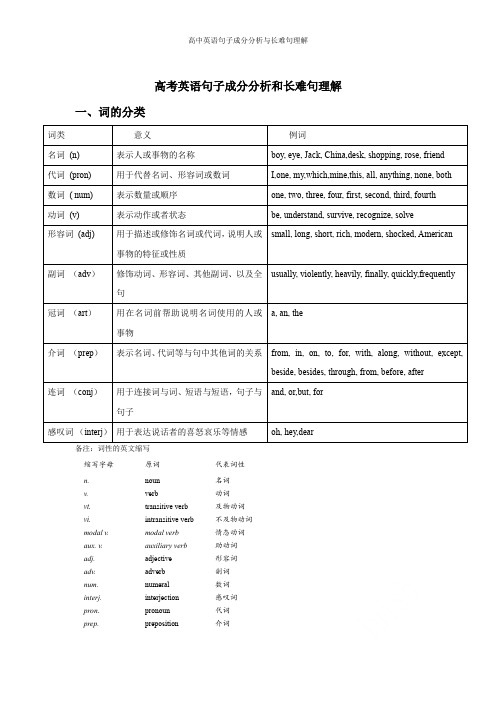
高考英语句子成分分析和长难句理解一、词的分类备注:词性的英文缩写缩写字母原词代表词性n. noun 名词v.verb动词vt.transitive verb 及物动词vi.intransitive verb 不及物动词modal v.modal verb 情态动词aux. v.auxiliary verb助动词adj.adjective形容词adv.adverb 副词num.numeral数词interj.interjection感叹词pron. pronoun 代词prep.preposition介词art.article冠词conj conjunction连词二、句子的成分在英文中句子成分包括:主语、谓语、宾语(直接宾语、间接宾语)、表语、定语和状语、宾语补足语等。
(一)主语:主语是谓语讲述的对象,表示所说的“是什么”或“是谁”。
一般由名词、代词、不定式或相当于名词的词或短语来充当。
它在句首。
如:(1)Lucy is a beautiful nurse. (名词作主语)(2)He reads newspapers every day. (代词作主语)(3)Smoking is harmful to the health. (动名词作主语)(4)To swim in Kunming Lake is a great pleasure.(不定式作主语)(5)What we should do is not yet decided. (主语从句作主语)(二)谓语说明主语“做什么”“是什么”或“怎么样”。
谓语(谓语部分里主要的词)必须是动词。
谓语和主语在人称和数两方面必须一致。
它在主语后面。
备注:动词的分类分类方式一:1.及物动词 2.不及物动词分类方式二:1.实义动词 2.系动词 3.助动词 4.情态动词考点1.及物动词和不及物动词实义动词后面跟宾语时,这个动词是及物动词。
实义动词后面不跟宾语时,此时这个动词是不及物动词。
高考英语句子成分语法分析之表语与同位语讲义

高中英语句子成分语法分析之表语与同位语表语表语和它前边的系动词一起构成复合谓语,用于说明主语的特征、状态、身份、类属等。
常见的系动词有下面这些:appear, be, become, fall, feel, get, go, grow, keep, look, prove, remain, rest, run, seem, smell, sound, stay, taste, turn表语表示法1) 名词* It is a long wait in the dark. 在黑暗中他们等了很长一段时间。
* That will be a good beginning, I hope. 我希望,这将是一个良好的开端。
* That remains a puzzle to me. 这对我还是个难题。
2) 代词* It's him. 是他。
* Is that book hers? 那本书是她的吗?* I'll be myself again in no time. 我过一会儿就会好的。
3) 数词* She is sixteen. 他十六岁。
* She is always the first to get up. 她总是第一个起床。
* He was the second to climb the mountain. 他是登这座山的第2人。
4) 形容词* She's keeping quite well.她身体一直保持得很好。
* The dish smells good. 这盘菜闻起来不错。
* She has gone mad. 她疯了。
5) 现在分词或过去分词作表语* What he said was very encouraging. 他的话很鼓舞人心。
* The flowers look charming after the rain. 雨后的鲜花看上去很漂亮。
* It was amazing that the boy was able to solve the problem so quickly. 那男孩能这么快解决这个问题真是令人惊奇。
高考英语如何做句子成分分析?一文轻松搞定!(9页)
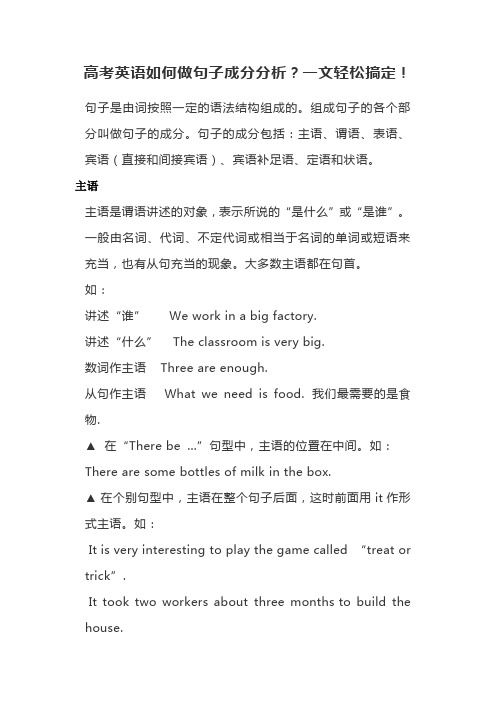
高考英语如何做句子成分分析?一文轻松搞定!句子是由词按照一定的语法结构组成的。
组成句子的各个部分叫做句子的成分。
句子的成分包括:主语、谓语、表语、宾语(直接和间接宾语)、宾语补足语、定语和状语。
主语主语是谓语讲述的对象,表示所说的“是什么”或“是谁”。
一般由名词、代词、不定代词或相当于名词的单词或短语来充当,也有从句充当的现象。
大多数主语都在句首。
如:讲述“谁” We work in a big factory.讲述“什么”The classroom is very big.数词作主语Three are enough.从句作主语What we need is food. 我们最需要的是食物.▲在“There be …”句型中,主语的位置在中间。
如:There are some bottles of milk in the box.▲在个别句型中,主语在整个句子后面,这时前面用it作形式主语。
如:It is very interesting to play the game called “treat or trick”.It took two workers about three months to build the house.谓语谓语时用来说明主语“做什么”、“是什么”或“怎么样”,谓语必须是动词,谓语和主语在“人称”和“数”两方面必须一致。
如:He is very generous.She looks very smart and coolWe have finished the job.He can speak German.表语表语说明主语“是什么”或“怎么样”,由名词、形容词、介词、副词、不定式及相当于名词的词或短语来充当,它的位置在系动词后面。
形容词作表语宾语▲宾语是动作、行为的对象,由名词、代词、不定式、或相当于名词的词或短语或从句来充当,它和谓语动词一起说明主语是什么,通常放在谓语动词后面。
2015江苏高考英语阅读理解D句子成分分析

Freedom and ResponsibilityFreedom’s challenge in the Digital Age is a serious topic. We are facing today a strange new world and we are all wondering what we are going to do with it.Some 2,500 years ago Greece discovered freedom. Before that there was no freedom. There were great civilizations, splendid empires, but no freedom anywhere. Egypt and Babylon were both tyrannies, one very powerful man ruling over helpless masses状语.In Greece, in Athens (雅典), a little city in a little country, there were no helpless masses. And Athenians willingly obeyed the written laws which they themselves passed定语, and the unwritten, which must be obeyed if free men live together定语. They must show each other间接宾语kindness and pity and the many qualities直接宾语without which life would be very painful unless one chose to live alone in the desert状语. The Athenians never thought that a man was free if he could do what he wanted. A man was free if he was self-controlled. 主语To make yourself obey what you approved was freedom. They were saved from looking at their lives as their own private affair. Each one felt responsible for the welfare of Athens, 状语not because it was forced on him from the outside, but becausethe city was his pride and his safety. 主语The essential belief of the first free government in the world was liberty for all men 定语who could control themselves and would take responsibility for the state.But discovering freedom is not like discovering computers. It cannot be discovered once for all. If people do not prize it, and work for it, it will go. Constant watch is its price. Athens changed. It was a change 定语that took place without being noticed though it was of the extreme importance, 同位语a spiritual change which affected the whole state. It had been the Athenian’s pride and joy to give to their city. That they could get material benefits from her主语never entered their minds. There had to be a complete change of attitude before they could look at the city as an employer who paid her citizens for doing her work定语. Now instead of men giving to the state, the state was to give to them. What the people wanted was a government 定语which would provide a comfortable life for them; and 状语with this as the primary object, 主语ideas of freedom and self-reliance and responsibility were neglected to the point of disappearing. Athens was more and more looked on 主补as a cooperative business定语possessed of great wealth 定语in which allcitizens had a right to share.Athens reached the point when t he freedom she really wanted主语was freedom from responsibility. There could be only one result. 状语If men insisted on being free from the burden of self-dependence and responsibility for the common good,they would cease to be free. Responsibility is the price 定语every man must pay for freedom. It is to be had on no other terms. Athens, the Athens of Ancient Greece, refused responsibility; she reached the end of freedom and was never to have it again.But, “the excellent becomes the permanent”, Aristotle said. Athens lost freedom forever, but freedom was not lost forever for the world. A great American, James Madison, referred to:“The capacity (能力) of mankind for self-government.” No doubt he had not an idea 同位语that he was speaking Greek. Athens was not in the farthest background of his mind, but once man has a great and good idea, it is never completely lost. The Digital Age cannot destroy it. Somehow in this or that man’s thought状语such an idea lives though unconsidered by the world of action状语. One can never be sure that it is not on the point of breaking out into action ,only sure that it will do so sometime.65. What does the underlined word “tyrannies” in Paragraph 2 refer to?A. Countries where their people need help.B. Powerful states with higher civilization.C. Splendid empires where people enjoy freedom.D. Governments ruled with absolute power.66. People believing in freedom are those who________.A. regard their life as their own businessB. seek gains as their primary objectC. behave within the laws and value systemsD. treat others with kindness and pity67. What change in attitude took place in Athens?A. The Athenians refused to take their responsibility.B. The Athenians no longer took pride in the city.C. The Athenians benefited spiritually from the government.D. The Athenians looked on the government as a business.68.What does the sentence “There could be only one result.” in Paragraph 5 mean?A. Athens would continue to be free.B. Athens would cease to have freedom.C. Freedom would come from responsibility.D. Freedom would stop Athens from self-dependence.69. Why does the author refer to Aristotle and Madison?A. The author is hopeful about freedom.B. The author is cautious about self-government.C. The author is skeptical of Greek civilization.D. The author is proud of man’s capacity.70. What is the author’s understanding of freedom?A. Freedom can be more popular in the digital age.B. Freedom may come to an end in the digital age.C. Freedom should have priority over responsibility.D. Freedom needs to be guaranteed by responsibility.。
句子成分分析高考复习总结专用或者英语入门专用

句子成分句子成分是指构成句子的各个组成部分,即词和词组在句子中的各种语法意义。
句子成分主要有主语、谓语、表语、宾语、定语、状语。
另外,一些句子还有一些其他的成分,如同位语、呼语、插入语等主语是指句子谈论的主题,说明的人或事物。
也就是句中动作、行为、性质和状态的主体。
主语可以用下面这些东西表示:1.名词;2. 代词;3. 数词;4. 动名词;5. 不定式;6. 词组或复合结构;7. 从句;8. 名词化的其他词类The sun rises in the east. ()He likes dancing. ()Twenty years is a short time in history. ( ) Seeing is believing. ()To see is to believe. ()What he needs is a book. ()It is very clear that the elephant is round and tall like a tree. ()说明主语的动作、状态和特征。
通常由动词的各种形式来充当。
并且和主语在人称和数上保持一致。
He is asleep.1.一般谓语都是由一个动词或动词短语来充当She got here at six. (动词)2.有些谓语是由“系动词+表语”构成的The girl felt cold. He is a teacher.3.有些谓语由“情态动词+动词原形”构成Can you speak French? We must be careful.4.如果不及物动词作谓语,则不可以直接加宾语,但可以在不及物动词后加介词再跟宾语We should depend on ourselves, not others. (depend为不及物动词)系动词之后的成分,表示主语的性质、状态和特征。
(常见的系动词有: be, sound(听起来), look smell(闻起来), taste(尝、吃起来),remain(保持,仍是), feel(感觉)...He is a teacher. ()Seventy-four! You don’t look it. ()Five and five is ten. ()He is asleep. ()His father is in. ()The picture is on the wall. ( )My watch is gone / missing / lost. ()To wear a flower is to say “I’m poor, I can’t buy a ring. ()The question is whether they will come. ()It sounds a good idea. ( ) The sound sounds strange. ( )Her voice sounds sweet. ( ) Tom looks thin. ( )The food smells delicious. ( ) The food tastes good. ( )The door remains open. ( ) Now I feel tired. ( )表示动作、行为的对象,和及物动词一起说明主语做什么,分为直接宾语和间接宾语两种。
2015江苏高考英语阅读理解B句子成分分析

In the United States alone, over 100 million cell-phones are thrown away each year. Cell-phones are part of a growing mountain of electronic waste like computers and personal digital assistants 定语. The electronic waste stream is increasing three times faster than traditional garbage as a whole.Electronic devices contain valuable metals 定语such as gold and silver. A Swiss study reported that while the weight of electronic goods 定语represented by precious metals was relatively small in comparison to total waste, the concentration (含量) of gold and other precious metals was higher in So-called e-waste than in naturally occurring minerals.Electronic wastes also contain many poisonous metals. Even when the machines are recycled and the harmful metals removed, 主句the recycling process often is carried out in poor countries, in practically uncontrolled ways 定语which allow many poisonous substances to escape into the environment.主语Creating products out of raw materials creates much more waste material, up to 100 times more, than the material 定语contained in the finished products. Consider again the cell-phone, and imagine the mines that produced those metals, thefactories needed to make the box and packaging(包装) it came in. Many wastes 定语produced in the producing process are harmful as well.The U.S. Environmental Protection Agency notes that most waste is dangerous in 宾语that “the production, distribution, and use of products — as well as management of the resulting waste — all result in greenhouse gas release.” Individuals can reduce their contribution by creating less waste at the start —独立成分for instance, buying reusable products and recycling.In many countries the concept of extended producer responsibility 主语is being considered or has been put in place as an incentive (动机) for reducing waste. If producers are required to take back packaging 定语they use to sell their products, would they reduce the packaging in the first place?Governments’ incentive 定语to require producers to take responsibility for the packaging they produce is usually based on money. Why, 独立成分they ask, should cities or townsbe responsible for paying to deal with the bubble wrap (气泡垫) that encased your television定语?From the governments’ point of view, 主语a primary goal of laws 定语requiring extended producer responsibility is 表语to transfer both the costs and the physicalresponsibility of waste management from the government and tax-payers back to the producers.58. By mentioning the Swiss study, the author intends to tell us that _________ .A. the weight of e-goods is rather smallB. E-waste deserves to be made good use ofC. natural minerals contain more precious metalsD. the percentage of precious metals is heavy in e-waste59. The responsibility of e-waste treatment should be extended _________ .A. from producers to governmentsB. from governments to producersC. from individuals to distributorsD. from distributors to governments60. What does the passage mainly talk about?A. The increase in e-waste.B. The creation of e-waste.C. The seriousness of e-waste.D. The management of e-waste.。
高考英语句子成分结构分析
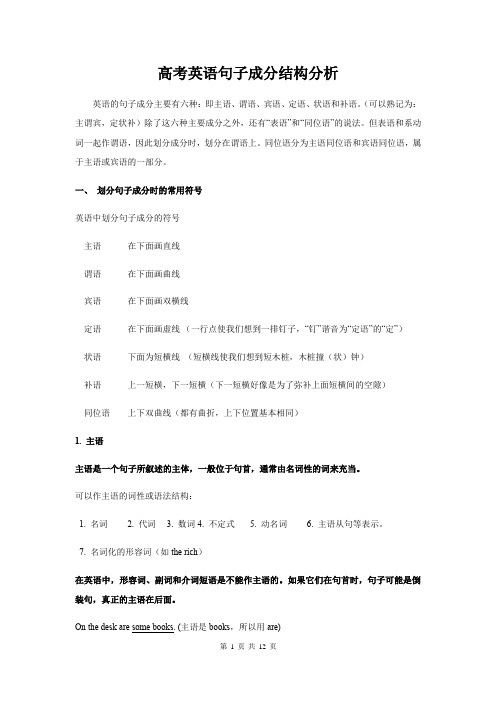
高考英语句子成分结构分析英语的句子成分主要有六种:即主语、谓语、宾语、定语、状语和补语。
(可以熟记为:主谓宾,定状补)除了这六种主要成分之外,还有“表语”和“同位语”的说法。
但表语和系动词一起作谓语,因此划分成分时,划分在谓语上。
同位语分为主语同位语和宾语同位语,属于主语或宾语的一部分。
一、划分句子成分时的常用符号英语中划分句子成分的符号主语在下面画直线谓语在下面画曲线宾语在下面画双横线定语在下面画虚线(一行点使我们想到一排钉子,“钉”谐音为“定语”的“定”)状语下面为短横线(短横线使我们想到短木桩,木桩撞(状)钟)补语上一短横,下一短横(下一短横好像是为了弥补上面短横间的空隙)同位语上下双曲线(都有曲折,上下位置基本相同)1. 主语主语是一个句子所叙述的主体,一般位于句首,通常由名词性的词来充当。
可以作主语的词性或语法结构:1. 名词2. 代词3. 数词4. 不定式5. 动名词6. 主语从句等表示。
7. 名词化的形容词(如the rich)在英语中,形容词、副词和介词短语是不能作主语的。
如果它们在句首时,句子可能是倒装句,真正的主语在后面。
On the desk are some books. (主语是books,所以用are)Down jumps the boy. (主语是the boy,所以用jumps )Gone are the days. (主语是the days,所以用are)练习:在下面句子的主语下面画横线,并说出由什么充当。
1. During the 1990s, American country music has become more and more popular.2. We often speak English in class.3. One-third of the students in this class are girls.4. To swim in the river is a great pleasure.5. Smoking does harm to the health.6. The rich should help the poor.7. When we are going to have English test has not been decided.8. It is necessary to master a foreign language.9. That he isn’t at home is not true.10. There comes the bus.11. Beyond the village lies a small village.12. Now comes your turn.2. 谓语谓语由动词充当,说明主语所做的动作或具有的特征和状态。
高考复习句子成分分析—长难句分析

辅助完形填空和单项选择等题型
完形填空
单项选择
阅读理解
通过对完形填空中句子成分的分析, 学生能更好地理解句子结构和语境, 准确快速地选出正确答案。
分析句子成分可以帮助学生更好地理 解题目中的语境和考查重点,提高做 题的正确率和速度。
句子成分分析法在阅读理解题型中具 有很高的应用价值,有助于学生快速 准确地把握文章重点和理解细节。
谓语
是用来描述主语的动作或状态的动词或形容词,通常 由一个动词或动词短语来表示。例如:“他们正在公 园里玩耍。”中的“正在玩耍”就是谓语。
宾语和主谓宾
宾语
是句子中动词动作的承受者,通常由一个名词、代词或名词性短语来表示。例如:“我喜欢吃苹果。 ”中的“苹果”就是宾语。
主谓宾
是指句子中有主语、谓语和宾语的句子结构。例如:“他喜欢看电影。”就是一个主谓宾结构的句子 。
06
总结与展望
总结句子成分分析的重要性和应用价值
句子成分分析是语言 理解和表达的关键
句子成分分析是语言理解和表达的基 础,它可以帮助学生更好地理解句子 的结构和含义,提高阅读和写作能力 。
句子成分分析在高考 中的应用价值
在高考语文考试中,句子成分分析常 常是考察的重点之一,掌握句子成分 分析的方法对于提高语文成绩非常重 要。
2023
高考复习句子成分分析— 长难句分析
目录
• 句子成分分析的概述 • 句子成分的基本类型 • 长难句分析的方法和技巧 • 高考英语长难句分析实例 • 句子成分分析在高考复习中的应用 • 总结与展望
01
句子成分分析的概述
句子成分分析的定义
句子成分分析是指对句子的构成成分进行分 析,以确定句子的主干和各级修饰语。
英语高考句子成分分析
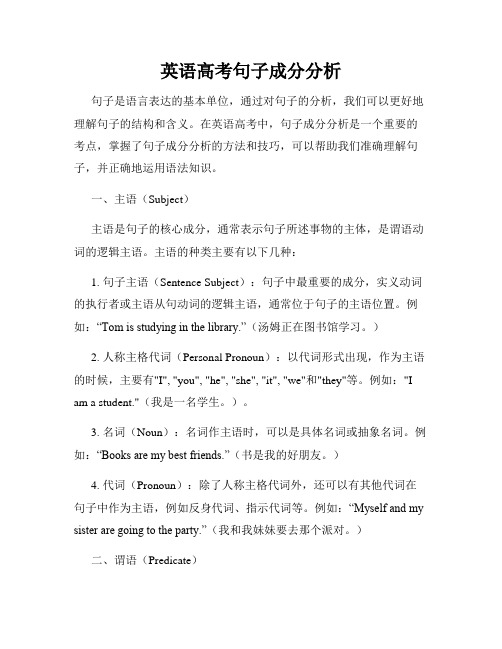
英语高考句子成分分析句子是语言表达的基本单位,通过对句子的分析,我们可以更好地理解句子的结构和含义。
在英语高考中,句子成分分析是一个重要的考点,掌握了句子成分分析的方法和技巧,可以帮助我们准确理解句子,并正确地运用语法知识。
一、主语(Subject)主语是句子的核心成分,通常表示句子所述事物的主体,是谓语动词的逻辑主语。
主语的种类主要有以下几种:1. 句子主语(Sentence Subject):句子中最重要的成分,实义动词的执行者或主语从句动词的逻辑主语,通常位于句子的主语位置。
例如:“Tom is studying in the library.”(汤姆正在图书馆学习。
)2. 人称主格代词(Personal Pronoun):以代词形式出现,作为主语的时候,主要有"I", "you", "he", "she", "it", "we"和"they"等。
例如:"I am a student."(我是一名学生。
)。
3. 名词(Noun):名词作主语时,可以是具体名词或抽象名词。
例如:“Books are my best friends.”(书是我的好朋友。
)4. 代词(Pronoun):除了人称主格代词外,还可以有其他代词在句子中作为主语,例如反身代词、指示代词等。
例如:“Myself and my sister are going to the party.”(我和我妹妹要去那个派对。
)二、谓语(Predicate)谓语是句子的另一个核心成分,表示主语的动作、状态或属性。
谓语可以由动词、形容词、副词、介词短语等构成。
1. 动词(Verb):动作类或状态类动词是常见的谓语成分,根据具体的语境和句子的时态、语态等情况,所用动词形式会有所差异。
江苏高考英语阅读理解c句子成分分析复习过程
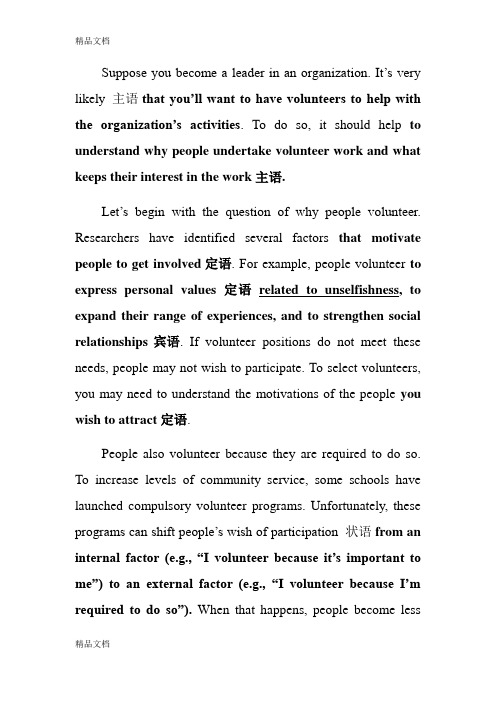
Suppose you become a leader in an organization. It’s very likely 主语that you’ll want to have volunteers to help with the organization’s activities. To do so, it should help to understand why people undertake volunteer work and what keeps their interest in the work主语.Let’s begin with the question of why people volunteer. Researchers have identified several factors that motivate people to get involved定语. For example, people volunteer to express personal values 定语related to unselfishness, to expand their range of experiences, and to strengthen social relationships宾语. If volunteer positions do not meet these needs, people may not wish to participate. To select volunteers, you may need to understand the motivations of the people you wish to attract定语.People also volunteer because they are required to do so. To increase levels of community service, some schools have launched compulsory volunteer programs. Unfortunately, these programs can shift people’s wish of participation 状语from an internal factor (e.g., “I volunteer because it’s important to me”) to an external factor (e.g., “I volunteer because I’m required to do so”).When that happens, people become lesslikely to volunteer in the future. People must be sensitive to this possibility when they make volunteer activities a must宾补.Once people begin to volunteer, what leads them to remain in their positions over time? To answer this question, researchers have conducted follow-up studies 定语in which they track volunteers over time. For instance, one study followed 238 volunteers in Florida over a year. One of the most important factors 定语that influenced their satisfaction as volunteers was the amount of suffering 定语they experienced in their volunteer positions. Although this result may not surprise you, it leads to important practical advice. The researchers note that attention should be given 状语to “training methods that would prepare volunteers for troublesome situations or provide them with strategies for coping with the problem they do experience”.Another study of 302 volunteers at hospitals in Chicago focused on individual differences in the degree 定语to which people view “volunteer” as an important social role. It was assumed that those people 定语for whom the role of volunteer was most part of their personal identity would also be most likely to continue volunteer work. Participants indicatedthe degree 定语to which the social role mattered by responding to statements such as “Volunteering in Hospital is an important part of who I am.”Consistent with the researchers’ expectations, they found a positive correlation (正相关) between the strength of role identity and the length of time people continued to volunteer定语. These results, once again, lead to concrete advice: “Once an individual begins volunteering, continued efforts might focus on developing a volunteer role identity.... Items like T-shirts 定语that allow volunteers to be recognized publicly for their contributions can help strengthen role identity”.61. People volunteer mainly out of ______.A. academic requirementsB. social expectationsC. financial rewardsD. internal needs62. What can we learn from the Florida study?A. Follow-up studies should last for one year.B.V olunteers should get mentally prepared.C. Strategy training is a must in research.D. V olunteers are provided with concrete advice.63. What is most likely to motivate volunteers to continue theirwork?A. Individual differences in role identity.B. Publicly identifiable volunteer T-shirts.C. Role identity as a volunteer.D. Practical advice from researchers.64. What is the best title of the passage?A. How to Get People to V olunteerB. How to Study V olunteer BehaviorsC. How to Keep Volunteers’ InterestD. How to Organize V olunteer Activities。
2015江苏高考英语阅读理解D句子成分分析
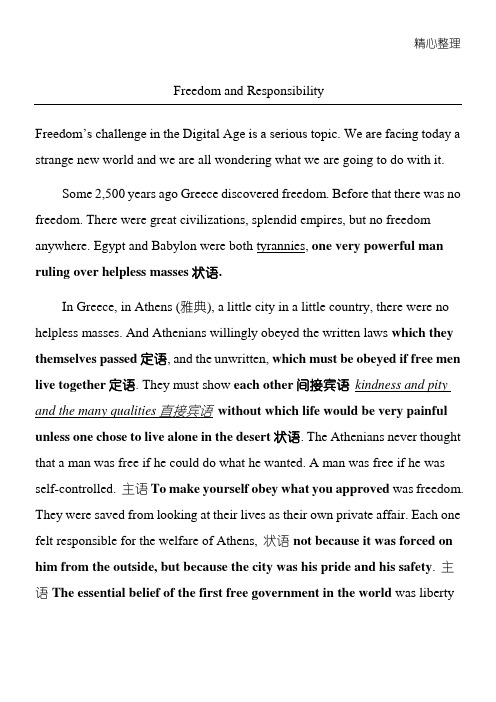
精心整理Freedom and ResponsibilityFreedom’s challenge in the Digital Age is a serious topic. We are facing today a strange new world and we are all wondering what we are going to do with it.live alone in the desert状语. The Athenians never thought that a man was free if he could do what he wanted. A man was free if he was self-controlled. 主语To make yourself obey what you approved was freedom. They were saved from looking at their lives as their own private affair. Each one felt responsible for the welfare ofAthens, 状语not because it was forced on him from the outside, but because the city was his pride and his safety. 主语The essential belief of the first free government in the world was liberty for all men 定语who could control themselves and would take responsibility for the state.workjoyherwho paidtothem; and 状语with this as the primary object, 主语ideas of freedom and self-reliance and responsibility were neglected to the point of disappearing. Athens was more and more looked on 主补as a cooperative business 定语possessed of great wealth 定语in which all citizens had a right to share.Athens reached the point when t he freedom she really wanted主语 was freedom from responsibility. There could be only one result. 状语If men insisted on being free from the burden of self-dependence and responsibility for the common good,they would cease to be free. Responsibility is the price 定语every man must pay for freedom. It isnevernot the it.sure that it is not on the point of breaking out into action ,only sure that it will do so sometime.65. What does the underlined word “tyrannies” in Paragraph 2 refer to?A. Countries where their people need help.B. Powerful states with higher civilization.C. Splendid empires where people enjoy freedom.D. Governments ruled with absolute power.66. People believing in freedom are those who________.Paragraph 5 mean?A. Athens would continue to be free.B. Athens would cease to have freedom.C. Freedom would come from responsibility.D. Freedom would stop Athens from self-dependence.69. Why does the author refer to Aristotle and Madison?A. The author is hopeful about freedom.B. The author is cautious about self-government.。
2015年江苏省高考英语试卷解析版
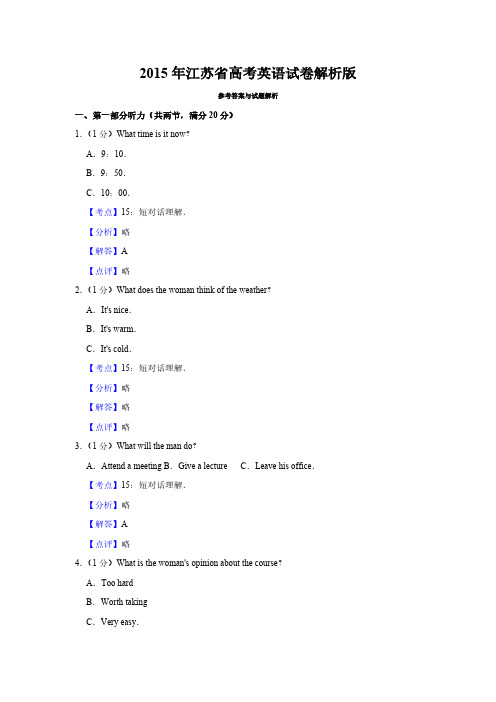
2015年江苏省高考英语试卷解析版参考答案与试题解析一、第一部分听力(共两节,满分20分)1.(1分)What time is it now?A.9:10.B.9:50.C.10:00.【考点】15:短对话理解.【分析】略【解答】A【点评】略2.(1分)What does the woman think of the weather?A.It's nice.B.It's warm.C.It's cold.【考点】15:短对话理解.【分析】略【解答】略【点评】略3.(1分)What will the man do?A.Attend a meeting B.Give a lecture C.Leave his office.【考点】15:短对话理解.【分析】略【解答】A【点评】略4.(1分)What is the woman's opinion about the course?A.Too hardB.Worth takingC.Very easy.【考点】15:短对话理解.【分析】略【解答】B【点评】略5.(1分)What does the woman want the man to do?A.Speak louder.B.Apologize to her.C.Turn off the radio.【考点】15:短对话理解.【分析】略【解答】C【点评】略6.(2分)(1)How long did Michael stay in China?A.Five days.B.One week.C.Two weeks.(2)Where did Michael go last year?A.Russia.B.Norway.C.India.【考点】16:长对话理解.【分析】略【解答】BC【点评】略7.(2分)听第7段材料,回答第8、9题.8.What food does Sally like?A.Chicken.B.Fish.C.Eggs.9.What are the speakers going to do?A.Cook dinner.B.Go shopping.C.Order dishes.【考点】16:长对话理解.【分析】略【解答】BC【点评】略8.(3分)(1)Where are the speakers?A.In a hospital.B.In the office.C.At home.(2)What is the report due?A.Thursday.B.Friday.C.Next Monday.(3)What does suggest Stephanie do with the report?A.Improve it.B.Hand it in later.C.Leave it with him.【考点】16:长对话理解.【分析】略【解答】BAB【点评】略9.(4分)(1)What is the probable relationship between the speakers?A.Salesperson and customer.B.Homeowner and cleaner.C.Husband and wife.(2)What kind of apartment do the speakers prefer?A.One with two bedroom.B.One without furniture.C.One near a market.(3)How much rent should one pay for the one﹣bedroom apartment?A.$350.B.$400.C.$415.(4)Where is the apartment the speakers would like to see?A.On Lake Street.B.On Market Street.C.On South Street.【考点】16:长对话理解.【分析】略【解答】略【点评】略10.(4分)(1)What percentage of the world's tea exports go to Britain?A.About 15%.B.About 30%.C.Over 40%.(2)Why do tea tasters taste tea with milk?A.Most British people drink that way.B.Tea tastes much better with milk.C.Tea with milk is healthy.(3)Who suggests a price for each tea?A.Tea tasters.B.Tea exporters.C.Tea companies.(4)What is the speaker talking about?A.The life of tea tasters.B.Afternoon tea in Britain.C.The London Tea Trade Centre.【考点】17:短文理解.【分析】略【解答】略【点评】略第二部分:英语知识运用(共两节,满分15分)第一节:单项填空(共15小题;每小题1分,满分15分)请阅读下面各题,从题中所给的A、B、C、D四个选项中,选出最佳选项,并在答题卡上将该项涂黑.11.(1分)The number of smokers,__________ is reported,has dropped by 17 percent in just one year.( )A.it B.which C.what D.as【考点】59:关系代词.【分析】正如所报道的那样,吸烟者的数量仅一年就减少了17%.【解答】答案D.这是含有非限制性定语从句的复合句,空缺的词为关系代词,故排除A、C.as引导的非限制性定语从句位置灵活,可以放在句首、句中、句末.本题容易误选B项,把the number of smokers看成是先行词,这里的关系代词指代的是the number of smokers has dropped by 17percent in just one year这一整句话,而且"as is reported"是常用表达法故选:D.【点评】对于关系代词的选择,要分析句子成分,还要结合关系代词本身的用法,加以选择和判断.12.(1分)Schools should be lively places where individuals are encouraged to _____ to their greatest potential.( )A.accelerate B.improve C.perform D.develop【考点】A8:实义动词.【分析】句意:学校应该是一个充满生机的地方,在这里每个学生个体都被鼓励充分发展,最大限度地激发潜能.【解答】答案D.A选项"加快,加速"常见搭配有"accelerate the pace of";B选项"改进,提高";C选项"表现,表演,执行";D选项"开发;发展;冲洗(胶片),养成";D项符合语境,故选:D.【点评】本题考查动词辨析.解答此类题目首先要读懂句意,然后根据上下文语境锁定合适的动词.平时要加强动词词汇量的积累.13.(1分)﹣Jim,can you work this Sunday?﹣__________?I've been working for two weeks on end.( )A.Why me B.Why not C.What if D.So what【考点】JI:语言交际.【分析】﹣﹣﹣Jim,这个星期六你能加班吗?﹣﹣﹣为什么是我?我已经连续工作两周了.【解答】答案A.选项A Why me?的意思是为什么是我;选项B Why not的意思是为什么不呢;选项C What if的意思是要是…会怎么样;选项D So what的意思是那又怎么样.根据语境和句意,应该选择A.【点评】做这类题目,要根据选项的意义、用法及句意来做出正确的选择和判断.14.(1分)Much time __________ sitting at a desk,office workers are generally troubled by health problems.( )A.being spent B.having spentC.spent D.spending【考点】A4:动词的过去分词;BB:过去分词.【分析】句意:因为大部分时间都坐在办公桌前,所以办公室职员一般都受健康问题的困扰.【解答】考查独立主格结构.由句子结构可知,分词的逻辑主语much time与主句主语office workers不一致,所以是独立主格结构.逗号后为主句,逗号前为独立主格结构作原因状语.time与spend是被动关系,故填spent.【点评】解答此类题目首先要分析句子结构找出主句,同时要注意主句的主语与分词的逻辑主语是否一致,如果不一致,则为独立主格结构.然后再分析分词的逻辑主语与动词的主被动关系,主动用doing,被动用done.15.(1分)__________ Li Bai,a great Chinese poet,was born is known to the public,but some won't accept it.( )A.That B.Why C.Where D.How【考点】79:连接副词;H7:wh﹣引导的主语从句.【分析】句意为:中国伟大诗人李白出生的地点是大众都知道的,但是一些人却不能接受这一点.【解答】答案:C.is之前的内容是主语从句,从句中缺少状语,根据逻辑关系,此处应该是出生的地方,而不是方式或原因.【点评】在主语从句中,除了要考虑句子成分,还要看句子前后的逻辑关系.16.(1分)It is so cold that you can't go outside __________ fully covered in thick clothes.( )A.if B.unless C.once D.when【考点】92:从属连词.【分析】句意:外面非常冷,如果不裹一件厚实点的衣服,千万不要出去.【解答】A选项"如果";C选项"一旦";D选项"当…时候";B选项"如果不;除非";unless=if…not,句中"unless fully covered"为"连词+省略结构",补充完整为"unless you are fully covered"可转换成"If you aren't fully covered"理解,根据句意及逻辑关系"外面非常冷"可推知"如果不裹一件厚实点的衣服会很冷."B项符合语境.故选:B.【点评】本题考查状语从句中连词的辨析.解答此类题目首先要理解题干的意思,其次要知道各选项的意思,然后依次把各个选项意思放入句子根据语境,不难选出正确答案.关键还是在平时学习的过程中,多积累多总结多记忆.17.(1分)The university started some new language programs to __________ the country's Silk Road Economic Belt.( )A.apply to B.cater for C.appeal to D.hunt for【考点】A9:动词短语.【分析】句意:这所大学开办了一些新的语言课程以满足国家丝绸之路经济带的需要.【解答】答案:B.apply to意为"向…申请;应用";appeal to意为"对…有吸引力;呼吁";hunt for意为"搜寻,猎捕,寻找".cater for意为"迎合,满足需要;供应伙食",其"迎合,满足需要"可使句意完整,符合逻辑,故选B.【点评】此题考查动词短语辨析.解此类词或短语辨析时,一要弄清句意,二要明白各选项的意思,从而选出符合句意的答案.18.(1分)It might have saved me some trouble __________ the schedule.( )A.did I know B.have I knownC.do I know D.had I known【考点】GB:倒装句;GJ:虚拟语气.【分析】它可能已省了我一些麻烦,要是我知道这个计划的话.【解答】根据主句谓语动词might have done,可以知道是对过去情况的假设,那么if从句中谓语动词则需用had done来表示对过去情况的假设,从而使得主从句保持一致.当虚拟条件句的谓语动词是助动词had时,if可以省略,从而将had置于句首,句子倒装.所以D选项正确.故选:D.【点评】此题考查虚拟语气中if省略倒装的现象.当虚拟条件句的谓语动词含有were,should(助动词),had(助动词)时,if可以省略,从而将were,should(助动词),had(助动词)置于句首,句子倒装.解此类题时,要根据语境、时间状语或主从句中的谓语动词形式,来判断是对过去、现在、将来三个时间里,哪一个时间的虚拟假设,再做题.19.(1分)The whole team _____ Cristiano Ronaldo,and he seldom lets them down.( )A.wait on B.focus on C.count on D.call on【考点】A9:动词短语.【分析】全队都寄希望于Cristiano Ronaldo,他很少令他们失望.【解答】wait on 意为"服侍,伺候";focus on意为"集中注意力于…";call on意为"拜访;号召".count on意为"指望,依靠"符合题意,故选C.【点评】此题考查动词短语辨析.解词义辨析题时,首先要弄清句意,再来选择合适的词或短语.20.(1分)The real reason why prices __________,and still are,too high is complex,and no short discussion can satisfactorily explain this problem.( )A.Were B.will be C.have been D.had been【考点】E2:一般过去时.【分析】过去和现在价格一直居高不下的真正原因很复杂,简短的讨论解释这一问题无法让人满意.【解答】答案A.根据句意和题干中的and still are 提示,可知过去的价格也一直居高不下,故用一般过去时,表示过去的状态,故选A.【点评】用何种时态,可以根据句意以及题目中所给的提示进行判断和选择.21.(1分)The police officers decided to conduct a thorough and __________ review of the case.( )A.comprehensive B.complicatedC.conscious D.crucial【考点】64:形容词词意辨析.【分析】警官决定对这起案件进行一次彻底的、广泛的审查.【解答】答案:AA项是"综合的,广泛的";B项是"复杂的";C项是"有意识的,神智清醒的";D项是"重要的,决定性的".句中thorough和comprehensive为并列关系,故选A项.【点评】形容词词义辨析,只要分清句子中形容词词义即可.22.(1分)Some schools will have to make __________ in agreement with the national soccer reform.( )A.judgments B.adjustmentsC.comments D.achievements【考点】A9:动词短语.【分析】一些学校将不得不作出调整以和国家足球改革相一致.【解答】答案B.make judgments意为"作出判断";make comments意为"发表评论";make achievements意为"取得成就".make adjustments意为"作出调整",结合句子的意思,"为了和国家足球改革相一致",所以要"作出调整",故选B.【点评】此题考查名词意思辨析.解此类词义辨析题时,需结合句意,辨清各选项的词义,从而选出正确的答案.23.(1分)﹣Why didn't you invite John to your birthday party?﹣Well,you know he's __________.( )A.an early bird B.a wet blanketC.a lucky dog D.a tough nut【考点】JI:语言交际.【分析】﹣﹣你为什么不邀请约翰来参加你的生日派对呢?﹣﹣哦,你知道他是一个令人扫兴的人.【解答】选项A an early bird 是指早起的人;选项B a wet blanket是指令人扫兴的人;选项C lucky dog是指幸运儿;选项D a tough nut是指难对付的人,这四个选项都是俗语,根据句意以及选项的意思,应该选择B.故选:B.【点评】做这类题目,首先要正确理解四个选项的意思,然后根据句意来选择正确的选项.24.(1分)Many of the things we now benefit from would not be around __________ Thomas Edison.( )A.thanks to B.regardless ofC.aside from D.but for【考点】GJ:虚拟语气.【分析】要不是托马斯爱迪生,我们现在收益的许多东西将不复存在.【解答】A选项thanks to"幸亏,多亏";B选项regardless of"不管,不顾";C选项aside from"除了,除…以外";D选项but for"要不是"可用来表示虚拟条件,可用if条件从句代替.but for Thomas Edison=if it hadn't been for Thomas Edison【点评】此题考查含蓄型虚拟语气.含蓄型虚拟语气常用without,but for引出,相当于If it weren't for…和If it hadn't been for…,其意为"若不是(有)""要不是".25.(1分)﹣Go and say sorry to your Mom,Dave.﹣I'd like to,but I'm afraid she won't be happy with my __________.( )A.requests B.excuses C.apologies D.regrets【考点】31:可数名词及其单复数.【分析】﹣﹣Dave,去向你妈妈说对不起.﹣﹣我想去,但是我怕她不会接受我的道歉.【解答】答案C A项是"请求";B项是"借口";C项是"道歉";D项是"后悔".由"say sorry"可知,此处应是"道歉".故选C项.【点评】根据情景对话辨析名词词义,只要弄明白对话的意思即可.第二节:完形填空(共1小题;每小题20分,满分20分)请阅读下面短文,从短文后各题所给的A、B、C、D四个选项中,选出最佳选项,并在答题卡上将该项涂黑.26.(20分)I was required to read one of Bernie Siegel's books in college and was hooked on his positivity from that moment on.The stories of his unconventional(36) ideas and the exceptional patients he wrote about were so(37) amazing to me and had such a big (38) impact on how I saw life from then on.Who knew that so many years later I would look to Dr.Bernie and his CDs again to )(39) getthrough my own cancer experience?I'm an ambitious(40) writer ,and when I started going through chemo (化疗),even though I'm a very(41) positive person,I lost my drive to write.I was just too tired and not in the(42) mood .One day,while waiting to go in for (43) treatment ,I had one of Dr.Bernie's books in my hand.Another patient (44) noticed what I was reading and struck up a conversation with me(45) because he had one of his books with him as well.It (46) turnedout that among other things,he was an eighty ﹣year﹣old writer.He was(47) actually a published author,and he was currently (48) working on a new book.We would see each other at various times and(49) became friends.Sometimes he wore a duck hat,and I would tell myself,he was definitely a(n)(50) fan of Dr.Bernie.He really put a (51) smile on my face.He unfortunately(52) passedaway last year due to his cancer,(53) but he left a deep impression on me and gave me the(54) inspiration to pick up my pen again.I(55) thought to myself,"If he can do it,then so can I."36.A.tastes B.ideas C.notes D.memories37.A.amazing B.shocking C.amusing D.strange38.A.strike B.push C.challenge D.impact39.A.learn from B.go over C.get through D.refer to40.A.reader B.writer C.editor D.doctor41.A.positive B.agreeable C.humorous D.honest42.A.mood B.position C.state D.way43.A.advice B.reference C.protection D.treatment 44.A.viewed B.knew C.noticed D.wondered 45.A.while B.because C.although D.providing 46.A.came out B.worked out C.proved out D.turned out 47.A.naturally B.merely C.hopefully D.actually 48.A.deciding B.investing C.working D.relying 49.A.became B.helped C.missed D.visited 50.A.patient B.operator C.fan D.publisher 51.A.sign B.smile C.mark D.mask 52.A.showed up B.set off C.fell down D.passed away 53.A.since B.but C.so D.for 54.A.guidance B.trust C.opportunity D.inspiration 55.A.promised B.swore C.thought D.replied【考点】L1:记叙文.【分析】本文是一篇记叙文.作者读了Bernie Siegel的书,深受书中积极人生观的影响.之后作者不幸身患癌症,病痛的折磨使他放弃了写作,但在治疗期间结识一位同样受到Bernie影响,年迈却仍坚持写作的病友.在病友死后,作者又重新拾起纸笔,以此告诉读者书籍给人带来积极的影响.【解答】36.B 考查名词.根据首段首句可知,作者读了Bernie Siegel的书,深受书中积极人生观的影响.此处unconventional ideas意为"非传统的观点"与上句中"积极的人生观"呼应.故选B项.37.A 考查形容词.根据上文中"unconventional(非传统的)"和"unexceptional(例外的)"提示可知,他书中所写的东西对我来说十分惊异.故选A项.38.D 考查名词.have an impact on为固定搭配,意为"对…有影响".A项"打击";B项"推,逼迫";C项"挑战";D项"影响".故选D项.39.C 考查动词短语.根据下文可知,作者不幸身患癌症,病痛的折磨使他放弃了写作.但病友的执着和Bernie Siegel积极的人生观让自己又重新拾起纸笔,渡过了这段艰难时期.A项"从…中获取经验,汲取教训";B项"复习,仔细检查";D项"提到,涉及,参考";C项"渡过难关";C项符合语境,故选C项.40.B 考查名词.根据下文中"I lost my drive to write"可知,作者是一名有抱负的作家.A项"读者";B项"作家";C项"编辑";D项"医生".故选B项.41.A 考查形容词.句意:尽管我是一个积极的人,还是失去了写作的动力.a positive person与I lost my drive to write构成让步关系,可推知,作者是一位非常积极乐观的人.故选A项.42.A 考查名词.根据语境作者因为病痛失去了写作的动力,感到太累,故可推知,作者心情不好.not in the mood意为"心情不好".故选A项.43.D 考查名词.根据作者生病了,应该是等待治疗,可知,D项符合语境.故选D项.44.C 考查动词.由下文可知,另一位病人应是注意到了作者正在读的书.notice"注意到".故选C项.45.B 考查连词.根据句意:"该空后是他主动和我攀谈的原因:他身上也有一本Bernie的书"可知,空处前后是因果关系,所以because表原因符合语境.故选B项.46.D 考查动词短语.A项"出现,出版";B项"锻炼,解决,制定";C项"证明是合适的,令人满意的";D项"证明是,结果是"."It turned out that"是固定搭配,意为"结果是…,结果证明…";根据语境"除此之外,他是一位八十岁的作家."可知,D项符合语境,故选D项.47.D 考查副词.A项"自然地";B项"仅仅";C项"有希望地";D项"事实上";根据句意"事实上,他是一位撰稿人,目前在写一本新书."可知,D项符合语境,故选D项.48.C 考查动词搭配.A项decide on"决定,确定";B项invest on"投资,花时间在…上";D项rely on"依赖,依靠";C项work on"从事,忙于";根据句意"他目前在写一本新书"可知,C项符合语境.故选C项.49.A 考查动词.A项"成为";B项"帮助";C项"错过";D项"拜访".根据句意"我们总是在许多时候见到对方,成了朋友"可知,后来作者和那位病人时不时地见面,也就成了朋友,A项符合语境,故选A项.50.C 考查名词.A项"病人";B项"操作员,接线员";C项"粉丝";D项"出版商".根据句意可知,他的确是Bernie的书迷.故选C项.51.B 考查名词.A项"标志,迹象,征兆";B项"微笑";C项"标记";D项"面罩".根据语境可知,作者原本心情不好,后来交了新朋友,心情也好转了,朋友的举动感染了我,使我在生活中面带微笑.故选B项.52.D 考查动词短语.A项"出现,露面";B项"出发,动身";C项"跌倒";D项"去世(死的委婉表达)".根据空前的"unfortunately"可知,作者的这位朋友去世了,D 项符合语境,故选D项.53.B 考查连词.A项表示时间;B项表示转折;C项表示结果;D项表示原因;根据句意"他去年不幸死于癌症,但给我留下了深刻的印象"可知,前后两分句之间是转折关系,故选B项.54.D 考查名词.A项"指导";B项"信任";C项"机会";D项"鼓舞,激励,启发";根据空后的"pick up my pen again"可知,他给了作者鼓舞,作者重新开始写作.故选D项.55.C 考查名词.A项"承诺";B项"郑重发誓";C项think to oneself"自言自语";D项"回答";根据句意"我对自己说:"如果他能做到,我也能"可知,C项符合语境,故选C项.【点评】解答此类题目可遵循以下步骤:第一步,通读全文,了解文章大意,获得整体印象,同时初选出一批较有把握的答案.第二步,边核对初选答案边补填留下的空格.如果短文难度较大,则可复读几遍,核对和确定答案.有些空一时决定不了,可作个记号,待复查时再确定.第三步,复查定稿.从整体理解角度出发,仔细审核答案,确保意义上、语法上没有错误,同时对遗留下来的少数几个空格作最后选择.第三部分:阅读理解(共4小题;每小题4分,满分30分)请阅读下列短文,从短文后各题所给的A、B、C、D四个选项中,选出最佳选项,并在答题卡上将该项涂黑. 27.(4分)56.According to the Code,visitors should act A .A.with care and respectB.with relief and pleasureC.with caution and calmnessD.with attention and observation57.What are you encouraged to do when travelling in New Zealand? C A.Take your own camping facilities.B.Bury glass far away from rivers.C.Follow the track for the sake of plants.D.Observe signs to approach nesting birds.【考点】O3:广告布告类阅读;P2:文中细节;P4:逻辑推理.【分析】本文大意不要携带任何有害新西兰的物品入境保护动植物恰当处理垃圾妥善处理排泄物保护水资源小心防火细心露营野炊不要另辟蹊径,有路走路处处留意【解答】56.A 推理判断题.根据文中的副标题可知,去新西兰旅游时不能携带任何危害到新西兰的物品,要保护动植物,处理好垃圾等可知,游客应该细心对待并尊重自然.故选A.57.C 细节理解题.根据文中keep to the track中的"keep to the track,where one exists,so you lessen the chance of damaging fragile plannts."可知,在有路的地方要沿着路走,这样可减少对脆弱植物的破坏.故选C.【点评】对于有副标题的应用文,解题时应抓住副标题来理解文章的大意,节省解题的时间.28.(6分)In the United States alone,over 100million cell﹣phones are thrown away each year.Cell﹣phones are part of a growing mountain of electronic waste like computers and personal digital assistants.The electronic waste stream is increasing three times faster than traditional garbage as a whole.Electronic devices contain valuable metals such as gold and silver.A Swiss study reported that while the weight of electronic goods represented by precious metals was relatively small in comparison to total waste,the concentration (含量)of gold and other precious metals was higher in So﹣called e﹣waste than in naturally occurring minerals.Electronic wastes also contain many poisonous metals.Even when the machines are recycled and the harmful metals removed,the recycling process often is carried out in poor countries,in practically uncontrolled ways which allow many poisonous substances to escape into the environment.Creating products out of raw materials creates much more waste material,up to 100times more,than the material contained in the finished products.Consider again the cell﹣phone,and imagine the mines that produced those metals,the factories needed to make the box and packaging(包装)it came in.Many wastes produced in the producing process are harmful as well.The U.S.Environmental Protection Agency notes that most waste is dangerous in that"the production,distribution,and use of products﹣as well as management of the resulting waste ﹣all result in greenhouse gas release."Individuals can reduce their contribution by creating less waste at the start﹣for instance,buying reusable products and recycling.In many countries the concept of extended producer responsibility is being considered or has been put in place as an incentive (动机)for reducing waste.If producers are required to take back packaging they use to sell their products,would they reduce the packaging in the first place?Governments'incentive to require producers to take responsibility for the packaging they produce is usually based on money.Why,they ask,should cities or towns be responsible for paying to deal with the bubble wrap (气泡垫)that encased your television?From the governments'point of view,a primary goal of laws requiring extended producer responsibility is to transfer both the costs and the physical responsibility of waste management from the government and tax﹣payers back to the producers.58.By mentioning the Swiss study,the author intends to tell us that B .A.the weight of e﹣goods is rather smallB.E﹣waste deserves to be made good use ofC.natural minerals contain more precious metalsD.the percentage of precious metals is heavy in e﹣waste59.The responsibility of e﹣waste treatment should be extended B .A.from producers to governmentsB.from governments to producersC.from individuals to distributorsD.from distributors to governments60.What does the passage mainly talk about? D A.The increase in e﹣waste.B.The creation of e﹣waste.C.The seriousness of e﹣waste.D.The management of e﹣waste.【考点】OA:健康环保类阅读;P1:内容归纳;P6:作者情感态度.【分析】文章主要介绍了电子垃圾的产生、危害以及相关解决措施.随着电子数码科技的进步,产生了越来越多的电子垃圾.手机、电脑和电子元器件等被越来越多地扔掉,里面含有像金银之类的贵金属,但也含有大量的有毒物质,作者详细地分析了造成这一问题的原因,并提出了坚决问题的建议和措施.【解答】58.B 推理判断题.文章第一段告诉我们,每年有大量废弃电子产品被随意丢弃.紧接着第二段首句"Electronic devices contain valuable metals such as gold and silver."指出:电子设备中含有有用的金属,如金和银,并用Swiss study佐证这一观点,据此可知作者想要告诉我们,电子垃圾值得被充分运用.故答案选B.59.B 细节理解题.文中六、七、八段围绕"生产责任延伸"展开,最后一段做了总结.根据最后一段的"a primary goal of laws requiring extended producer responsibility is to transfer both the costs and the physical responsibility of waste management from the government and tax﹣payers back to the producers."可知处理电子垃圾的责任应该从政府延伸到用户身上.故答案选B.60.D 主旨大意题.这篇短文主要讲述了电子垃圾被随意丢弃这一现象,文中详细分析了造成这一问题的原因,并提出了建议.故答案选D"电子垃圾的管理".而其余三项都只是概括了文章的部分内容,并不能概括全文.【点评】健康环保类文章常是介绍科学知识、生活常识和环境保护方面的短文.阅读此类短文要以现象或事物为中心进行思考,理解现象产生的原因、条件和客观规律等.同时要抓住事物的特征、用途和相互关系等.由于此类文章缺乏故事情节,很多同学对此类文章感到费解.文章都是就事论事,需要逻辑推理和想象的时候较少,因此此类阅读题也没有同学们想象中的那么难,只要多加训练,就能较好地答题.29.(8分)Suppose you become a leader in an organization.It's very likely that you'll want to have volunteers to help with the organization's activities.To do so,it should help to understand why people undertake volunteer work and what keeps their interest in the work.Let's begin with the question of why people volunteer.Researchers have identified several factors that motivate people to get involved.For example,people volunteer to express personal values related to unselfishness,to expand their range of experiences,and to strengthen social relationships.If volunteer positions do not meet these needs,people may not wish to participate.To select volunteers,you may need to understand the motivations of the people you wish to attract.People also volunteer because they are required to do so.To increase levels of community service,some schools have launched compulsory volunteer programs.Unfortunately,these programs can shift people's wish of participation from an internal factor (e.g.,"I volunteer because it's important to me")to an external factor (e.g.,"I volunteer because I'm required to do so").When that happens,people become less likely to volunteer in the future.People must be sensitive to this possibility when they make volunteer activitiesa must.Once people begin to volunteer,what leads them to remain in their positions over time?To answer this question,researchers have conducted follow﹣up studies in which they track volunteers over time.For instance,one study followed 238volunteers in Florida over a year.One of the most important factors that influenced their satisfaction as volunteers was the amount of suffering they experienced in their volunteer positions.Although this result may not surprise you,it leads to important practical advice.The researchers note that attention should be given to"training methods that would prepare volunteers for troublesome situations or provide them with strategies for coping with the problem they do experience".Another study of 302volunteers at hospitals in Chicago focused on individual differences in the degree to which people view"volunteer"as an important social role.It was assumed that those people for whom the role of volunteer was most part of their personal identity would also be most likely to continue volunteer work.Participants indicated the degree to which the social role mattered by responding to statements such as"Volunteering in Hospital is an importantpart of who I am."Consistent with the researchers'expectations,they found a positive correlation (正相关)between the strength of role identity and the length of time people continued to volunteer.These results,once again,lead to concrete advice:"Once an individual begins volunteering,continued efforts might focus on developing a volunteer role identity…Items like T﹣shirts that allow volunteers to be recognized publicly for their contributions can help strengthen role identity".61.People volunteer mainly out of D .A.academic requirementsB.social expectationsC.financial rewardsD.internal needs62.What can we learn from the Florida study? B A.Follow﹣up studies should last for one year.B.Volunteers should get mentally prepared.C.Strategy training is a must in research.D.Volunteers are provided with concrete advice.63.What is most likely to motivate volunteers to continue their work? C A.Individual differences in role identity.B.Publicly identifiable volunteer T﹣shirts.C.Role identity as a volunteer.D.Practical advice from researchers.64.What is the best title of the passage? A A.How to Get People to VolunteerB.How to Study Volunteer BehaviorsC.How to Keep Volunteers'InterestD.How to Organize Volunteer Activities.【考点】O6:社会文化类阅读;P1:内容归纳;P2:文中细节;P4:逻辑推理.【分析】文章分析了志愿者为何自发地去服务社会,研究者通过研究发现:人们做志愿者工作主要是出于内在的需求,因为他们需要这样做,志愿者身份的认可会激励他们继。
高考英语句子成分与句子结构专项讲解

高考英语句子成分与句子结构专项讲解一、考点分析(考查形式:语法填空,句子翻译,及阅读中对句子的理解)二、专题详解Sentence Structure 句子成分练习①The teacher with two of his students is walking into the classroom.②There is an old man coming here.③The useful dictionary was given by my mother last year.④To do today's homework without the teacher's help is very difficult.(一) ①teacher ②man ③dictionary ④To do①I don't like the picture on the wall.A. don'tB. likeC. pictureD. wall②The days get longer and longer when summer comes.A. getB. longerC. daysD. summer③Do you usually go to school by bus?A. DoB. usuallyC. goD. bus④There will be a meeting at the library this afternoon.A. will beB. meetingC. the libraryD. afternoon⑤Did the twins have porridge for their breakfast?A. DidB. twinsC. haveD. breakfast⑥Tom didn't do his homework yesterday.A. TomB. didn'tC. doD. his homework⑦What I want to tell you is this.A. wantB. to tellC. youD. is⑧We had better send for a doctor.A. WeB. hadC. sendD. doctor⑨He is interested in music.A. isB. interestedC. inD. music⑩Whom did you give my book to?A. giveB. didC. whomD. book(二) ①B ②A ③C ④A ⑤C ⑥C ⑦D ⑧C ⑨A ⑩A①The old man was feeling very tired.②Why is he worried about Jim?③The leaves have turned yellow.④Soon They all became interested in the subject.⑤She was the first to learn about it.①tired②worried ③yellow④interested ⑤the first①They use Mr. Mrs. with the family name.②What is your given name?③On the third lap are Class 1 and Class 3.④I am afraid some people forgot to sweep the floor.⑤The man downstairs was trying to sleep.⑥I am waiting for the sound of the other shoe!①with the family name②given ③third④afraid ⑤downstairs ⑥of theother shoe①My brother hasn't done his homework.②People all over the world speak English.③You must pay good attention to your pronunciation.④How many new words did you learn last class?⑤Some of the students in the school want to go swimming, how about you?⑥The old man sitting at the gate said he was ill.⑦They made him monitor of the class.⑧Go across the bridge and you will find the museum on the left.⑨You will find it useful after you leave school.⑩They didn't know who "Father Christmas" really is.⑾She always thinks of how she can improve her spoken English.⑿Alisa is sorry for what she said.①his homework②English③good attention, your pronunciation④new words ⑤to go ⑥he wasill⑦him ⑧the bridge; the museum ⑨it⑩who "Father Christmas" really is.⑾how she can improve her spoken English ⑿what she said①She likes the children to read newspapers and books in the reading-room.②He asked her to take the boy out of school.③She found it difficult to do the work.④They call me Lily sometimes.⑤I saw Mr. Wang get on the bus.⑥Did you see Li Ming playing football on the playground just now?①to read②to take ③difficult④Lily ⑤get on ⑥playing①There was a big smile on her face.②Every night he heard the noise upstairs.③He began to learn English when he was eleven.④The man on the motorbike was travelling too fast.⑤With the medicine box under her arm, Miss Li hurried off.⑥She loves the library because she loves books.⑦I am afraid that if you've lost it, you must pay for it.⑧The students followed Uncle Wang to see the other machine.①On her face②every night ③when he was eleven④too fast⑤With the medicine boxunder her arm⑥because she loves books⑦if you've lost it,⑧to see the other machine①Please tell us a story.②My father bought a new bike for me last week.③Mr. Li is going to teach us history next term.④Here is a pen. Give it to Tom.⑤Did he leave any message for me?⑥He told us once again that the situation was serious.(八) ①us, 间接宾语 a story, 直接宾语②me, 间接宾语a new bike, 直接宾语③us, 间接宾语history, 直接宾语④Tom, 间接宾语it, 直接宾语⑤me, 间接宾语message, 直接宾语⑥us间接宾语;that the situation was serious 直接宾语1. The students got on the school bus.2. He handed me the newspaper.3. I shall answer your question after class.4. What a beautiful Chinese painting!5. They went hunting togetherearly in the morning.6. His job is to train swimmers.7. He took many photos of the palacesin Beijing.8. There is going to be an American film tonight.9. He is to leave for Shanghai tomorrow.10. His wish is to become a scientist.11. He managedto finish the work in time.12. Tom came to ask me for advice.13. I have no idea when he was born.14. I don’t know the time when he was born.1、主语,定语;2、间接宾语;3、谓语,状语;4、定语;5、状语,状语;6、定语,表语;7、宾语,状语;8、谓语;9、谓语;10、主语,表语;11、谓语,宾语;12、状语;13 同位语14 定语句子,按结构,分为三类:简单句、并列句和复合句。
高考英语句子成分分析运用
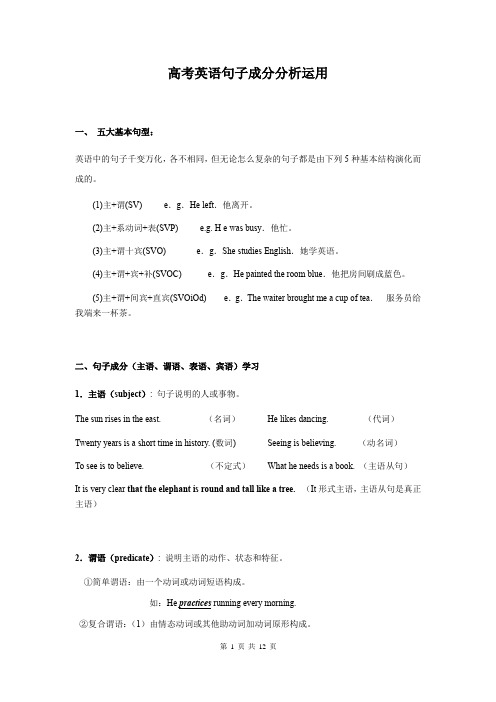
高考英语句子成分分析运用一、五大基本句型:英语中的句子千变万化,各不相同,但无论怎么复杂的句子都是由下列5种基本结构演化而成的。
(1)主+谓(SV) e.g.He left.他离开。
(2)主+系动词+表(SVP) e.g. H e was busy.他忙。
(3)主+谓十宾(SVO) e.g.She studies English.她学英语。
(4)主+谓+宾+补(SVOC) e.g.He painted the room blue.他把房间刷成蓝色。
(5)主+谓+间宾+直宾(SVOiOd) e.g.The waiter brought me a cup of tea.服务员给我端来一杯茶。
二、句子成分(主语、谓语、表语、宾语)学习1.主语(subject): 句子说明的人或事物。
The sun rises in the east. (名词)He likes dancing. (代词)Twenty years is a short time in history. (数词) Seeing is believing. (动名词)To see is to believe. (不定式)What he needs is a book. (主语从句)It is very clear that the elephant is round and tall like a tree.(It形式主语,主语从句是真正主语)2.谓语(predicate): 说明主语的动作、状态和特征。
①简单谓语:由一个动词或动词短语构成。
如:He practices running every morning.②复合谓语:(1)由情态动词或其他助动词加动词原形构成。
如:You may keep the book for two weeks.He has caught a bad cold.(2)由系动词加表语构成。
如:We are students.3.表语(predicative): 系动词之后的成分,表示主语的性质、状态和特征。
- 1、下载文档前请自行甄别文档内容的完整性,平台不提供额外的编辑、内容补充、找答案等附加服务。
- 2、"仅部分预览"的文档,不可在线预览部分如存在完整性等问题,可反馈申请退款(可完整预览的文档不适用该条件!)。
- 3、如文档侵犯您的权益,请联系客服反馈,我们会尽快为您处理(人工客服工作时间:9:00-18:30)。
Suppose you become a leader in an organization. It’s very likely 主语that you’ll want to have volunteers to help with the organization’s activities. To do so, it should help to understand why people undertake volunteer work and what keeps their interest in the work主语.
Let’s begin with the question of why people volunteer. Researchers have identified several factors that motivate people to get involved定语. For example, people volunteer to express personal values 定语related to unselfishness, to expand their range of experiences, and to strengthen social relationships宾语. If volunteer positions do not meet these needs, people may not wish to participate. To select volunteers, you may need to understand the motivations of the people you wish to attract定语.
People also volunteer because they are required to do so. To increase levels of community service, some schools have launched compulsory volunteer programs. Unfortunately, these programs can shift people’s wish of participation 状语from an internal factor (e.g., “I volunteer because it’s important to me”) to an external factor (e.g., “I volunteer because I’m required to do so”).When that happens, people become less likely to volunteer in the future. People must be sensitive to this
possibility when they make volunteer activities a must宾补.
Once people begin to volunteer, what leads them to remain in their positions over time? To answer this question, researchers have conducted follow-up studies 定语in which they track volunteers over time. For instance, one study followed 238 volunteers in Florida over a year. One of the most important factors 定语that influenced their satisfaction as volunteers was the amount of suffering 定语they experienced in their volunteer positions. Although this result may not surprise you, it leads to important practical advice. The researchers note that attention should be given 状语to “training methods that would prepare volunteers for troublesome situations or provide them with strategies for coping with the problem they do experience”.
Another study of 302 volunteers at hospitals in Chicago focused on individual differences in the degree 定语to which people view “volunteer” as an important social role. It was assumed that those people 定语for whom the role of volunteer was most part of their personal identity would also be most likely to continue volunteer work. Participants indicated the degree 定语to which the social role mattered by responding to statements such as “Volunteering in Hospital
is an important part of who I am.”Consistent with the researcher s’ expectations, they found a positive correlation (正相关) between the strength of role identity and the length of time people continued to volunteer定语. These results, once again, lead to concrete advice: “Once an individual begins volunteering, continued efforts might focus on developing a volunteer role identity.... Items like T-shirts 定语that allow volunteers to be recognized publicly for their contributions can help strengthen role identity”.
61. People volunteer mainly out of ______.
A. academic requirements
B. social expectations
C. financial rewards
D. internal needs
62. What can we learn from the Florida study?
A. Follow-up studies should last for one year.
B.
V olunteers should get mentally prepared.
C. Strategy training is a must in research.
D. V olunteers are provided with concrete advice.
63. What is most likely to motivate volunteers to continue their work?
A. Individual differences in role identity.
B. Publicly identifiable volunteer T-shirts.
C. Role identity as a volunteer.
D. Practical advice from
researchers.
64. What is the best title of the passage?
A. How to Get People to V olunteer
B. How to Study V olunteer Behaviors
C. How to Keep Volunteers’ Interest
D. How to Organize V olunteer Activities。
